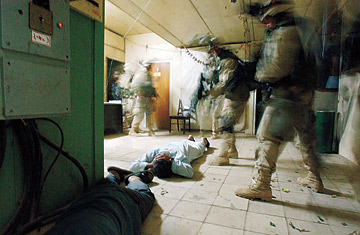
U.S. Army Infantry Rangers detain two Iraqi men inside a government building in Baquba, Iraq, in April 2003
The first time most Americans heard the name Stanley McChrystal was in mid-2009, when President Obama promoted him to four-star general and commander of U.S. and allied forces in Afghanistan. The appointment took many in Washington by surprise too: Stanley who? McChrystal was not a man accustomed to the schmoozing rituals of the Beltway. But national security cognoscenti knew exactly who he was: a killer. Having just completed a five-year stint as the chief of Joint Special Operations Command (JSOC), which oversees America's most secret military units, like SEAL Team 6 and Delta Force, Stan McChrystal was the quintessential black-ops warrior. McChrystal was one of a new generation of military leaders who became top commanders in the post-9/11 era and completed the transition from a military run by Cold Warriors like Norman Schwarzkopf, Tommy Franks, and Colin Powell to one focused on terrorism and the so-called small wars that prevail today.
A West Point graduate, McChrystal did several tours with the Army Rangers and developed a reputation as a kind of warrior monk, getting by on only one meal and a few hours of sleep a day. He was known as an aggressive soldier unafraid of the moral ambiguities of black ops, yet also a scholar who had put in stints at Harvard and the Council on Foreign Relations. During his 2003-08 tenure at JSOC, McChrystal forged better ties with the CIA and other intelligence units, leading to several successes like the capture of Saddam Hussein in 2003 and the killing of Abu Musab al-Zarqawi, the leader of al Qaeda in Iraq, in 2006. Under McChrystal, JSOC became a terrorist-hunting operation conducting thousands of missions and ratcheting up its proficiency and lethality. But controversy followed McChrystal as well. Thirty-four members of one JSOC task force were disciplined in 2004 for prisoner abuse at Abu Ghraib. McChrystal and his coterie were so accustomed to operating in the shadows that it eventually undermined his career. He was forced to resign in 2010, after Rolling Stone quoted members of his staff making disparaging remarks about the President and Vice President.
McChrystal's departure had little to do with policy differences. In fact, Obama had surprised many by not only maintaining his predecessor's focus on special ops but intensifying it. In 2009, Obama named Vice Adm. William McRaven as McChrystal's successor to head JSOC, the first Navy SEAL to run the command. Under McRaven, JSOC has expanded its activities even further beyond the battlefields of Afghanistan and Iraq, including a deal with Yemeni President Ali Abdullah Saleh to conduct clandestine operations with Yemeni troops against al Qaeda in the Arabian Peninsula. But McRaven dedicated most of his attention to Afghanistan. On his watch U.S. special ops forces killed or captured hundreds of Taliban and terrorist leaders, primarily in the new style of rapid-fire, unrelenting nighttime raids. The raids, sometimes numbering more than a dozen a night, have been one of the cornerstones of the Afghan war strategy. "Nobody thought it would be possible, frankly, to take that command beyond what Stan McChrystal did, but he has," Michael G. Vickers, undersecretary of defense for intelligence, told the Washington Post. "He has taken what was already a very integrated interagency organization and taken it to another level." In April, Obama promoted him to head the U.S. Special Operations Command, which oversees not only JSOC but more conventional special ops units like the Green Berets and Army Rangers.
Order a copy of Special Ops at time.com/specialops.
